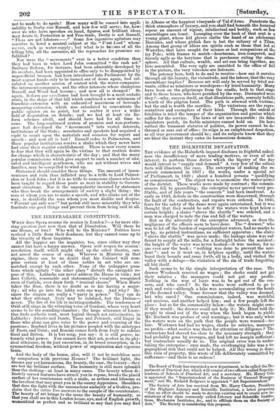THE HOLMFIRTH DEVASTATION.
THE evidence at the Holmfirth inquest discloses in frightful naked- ness the insufficiency of mere trading motives or even of self- interest, to perform those duties which the bigotry of the day would intrust to "supply and demand." A very few of the salient facts will illustrate the case. The enterprise of making the re- servoir commenced in 1837; the works, under a special act of Parliament, in 1839; about a hundred persons "qualifying as commissioners." The object was to economize the water-power of the district These works were made by contract; the commis- sioners fell to quarrelling ; the enterprise never proved very pro- fitable, and of late years "the concern" had been insolvent. As early as 1843, defects in the construction were discovered, through the fault of the contractors, and repairs were ordered. In 1846, fears for the safety of the dams were again entertained, but it was thought that they would be safe if the waters were kept below a certain height; a sluice "above the shuttle" was ordered, and a man was charged to note the rise and fall of the waters. But as the adversity of the enterprise advanced, so does the negligence of the officers seem to have done. The" drawer," who -was to let off the burden of superabundant waters, had no marks to go by, no printed instructions, no sufficient apparatus ; the sluice "above the shuttle" was never made; the leakage alone was suf- ficient to supply all the mills, for a fortnight before the accident ; the height of the water was never booked—it was useless for no one ever saw the book ; "nothing was done to prevent the acci- dent ": and so it went on, in helpless apathy, until the waters burst their bounds and came forth, all in a body, and visited the valley with a deluge—the visitation of the sin of trade forgetting all but itself.
Such seems to be the simple interpretation of the case. The drawer Woodcock received no wages • the clerks could not get their salaries ; the managers could not get any profits. Nothing in the way of lucre was to be got out of the con- cern' and who cared ? So the works were suffered to go to rack and ruin—although a lake was accumulating over the heads of the doomed valley. Some foresaw that the valley was doomed, but who cared ? One commissioner, indeed, was watchful and anxious, and another helped him ; and a few people left the place : but as for the commonalty below—the waters might come if they would : the drawer could not help it; Mr. Hirst told the people to stand out of the way when the bank began to yield; Mr. Roebuck was profuse of oral warnings; but it was only when the waters were on the path that the people were warned—too late. Workmen had had no wages, clerks no salaries, managers no profits—what motive was there for attention or diligence ? The contractors had shaved too close to the necessary strength ; they had probably gone by averages, and had left no margin sufficient: bat contractors usually do so. The original error was in under- taking the enterprise : once made' the overhanging lake was a to- pographical risk that could not be helped. All this wrong is done, this ruin of property, this waste of life deliberately committed by sufferance—and there is no redress !


























 Previous page
Previous page